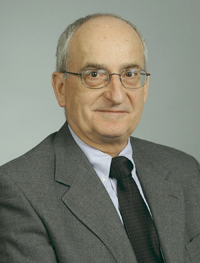Reversing el curse
BU sports psychologist hopes to nudge Spain to World Cup victory

If you were a Red Sox fan anytime between 1918 and their glorious 2004 American League Championship victory over the Yankees and subsequent World Series sweep, then you have a pretty good idea of how Spanish soccer fans feel.
Spain is known for great soccer, passionate fans, outstanding players, and talent-rich national teams that look like world-beaters. But every World Cup has been a heartbreaker, with the Spanish making hasty exits in tournament after tournament and never once reaching the final match.
But as this summer’s 2006 World Cup approaches, hosted by Germany, Spain has some advantages: the team has a wily new national team coach, Luis Aragones; it is ranked sixth in the world, with its usual roster of star players, and has the luck of relatively low-ranked opening-round competition; and it has the advice of — Leonard Zaichkowsky, a Boston University professor and director of sports psychology training, which is jointly administered by the School of Education and the School of Medicine. Zaichkowsky’s task: get the Spanish national team players to start thinking like champions.
“We’re trying not to dwell on history,” says Zaichkowsky, who first met the team in April in Madrid. “We’re trying to emphasize that this is a different team, with a different coach, a different everything.”
The Spanish team does indeed seem in need of a psychic break from the past. Its best World Cup performance came in a 1950 semifinal defeat at the hands of Brazil. In subsequent tournaments, it has never advanced beyond the quarterfinals, and one of the more infamous bow-outs came in 1982, when Spain hosted the World Cup but managed only one victory.
Aragones, who is something of a Spanish soccer icon, has coached the national team since the summer of 2004 and guided it through an undefeated World Cup qualifying run (although half those games were ties). He caused something of a stir by leaving a few star veterans off his roster in favor of younger players. And he led the push to hire Zaichkowsky, who has an international reputation in sports psychology circles, having counseled Olympic athletes and professional teams such as the Boston Celtics and the National Hockey League’s Calgary Flames.
The Spaniards’ decision to hire an American to pull them out of their historical soccer funk was helped by the fact that Zaichkowsky’s assistant, and former grad student, Anselmo Vicioso (SED’06), played professional indoor soccer in Spain in the late 1970s and early 1980s and has contacts in the Spanish Soccer Federation.
“I don’t speak the language,” says Zaichkowsky, “but Anselmo’s a Spaniard and is fluent. He knows the game, and he knows the culture.” Consequently, Vicioso is already in Spain, while Zaichkowsky will consult with him daily by phone until he joins up with the team in early June, a couple weeks before its first match, against Ukraine.
Of course, anything soccer-related is big news in Spain, and according to Vicioso, he and his boss have been treated “like real celebrities.” But, he says, “we do not enjoy or like that role.” The two men have a job to do, he says, and not a lot of time to get it done.
Beginning with group discussions, Zaichkowsky and Vicioso will try to help the Spanish players deal with pressure, make quick in-game decisions, and come together as a team. For instance, players will be requested to think about scenarios both on and off the field when they must make fast and accurate choices, and they will discuss factors and be asked to “mentally rehearse” those decisions, as Zaichkowsky puts it, so that they come naturally in the pressure of a real game.
They’ll also put together DVDs of every player’s highlight reel. “We want to get them thinking along the lines of great performances,” says Zaichkowsky, who will also try to fire up the players with stories of people who have excelled in areas outside of soccer. “I believe strongly in going across domains for inspiration,” he says.
Players will then meet individually with Zaichkowsky and Vicioso to reinforce these group lessons and to talk about whatever else is on their mind. “They may have things that are bothering them in their own life that are affecting their play on the field,” Zaichkowsky notes. Yet he’s quick to counter the idea that psychologists are needed only to help with the mentally troubled, a stereotype that he says led some in the Spanish Soccer Federation to oppose Aragones’ decision.
“We’re not looking for mental health problems,” says Zaichkowsky. “Psychology has a positive dimension, helping normal people achieve their highest potential.”
In Vicioso’s words, the pair will practice “positive psychology” based on “optimism and focus” to “maximize mental strength.”
Zaichkowsky adds that he told the team, “You guys are all playing at a high level, and we want to take you to a championship level.” This brings up the final dimension of his task — helping all these high-caliber players who normally play on different squads, even in different countries, come together as a team. “We’ll be working on genuinely caring about each other,” he says. “That’s the only way they’re going to win a world championship.”
Indeed, winning, or at least gaining a berth in the final match, is what Aragones has promised his soccer-mad country. To get the team ready, Aragones will focus on their feet and let Zaichkowsky and Vicioso deal with their heads. For now, before the first whistle is blown in Germany, Spanish soccer fans can sit back and relish the possibility that their team will start thinking and playing like champions and enter a new era of victory. They are free to enjoy that excited buzz, which loosely translates to: “This could be the year.”